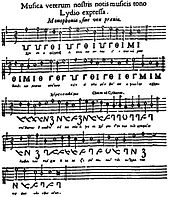Ode
Ode ( female , about Latin ode from ancient Greek ᾠδή Ode , literally "[the] song" or "[the] song") is the name of a song or a lyric, first in Greek.
Ancient odes
In ancient Greece, a chant that was played to an accompanying musical instrument was called an ode, also a monody or a choral song . Later the texts were sometimes also recited instead of sung. The highlights are the odes of Pindar , which he also set to music himself.
The most important author of Latin odes was Horace .
Biblical odes
Around 130 AD, 142 chants were written in the Syrian language, which appear as Oden Solomon in some biblical manuscripts.
A collection of 14 odes (chants) from various books of the Old and New Testaments has been included as appendices in Greek psalters since the 6th century .
Odes in the liturgy
Nine odes as hymn chants form the basis for the canon in the liturgy of the Orthodox churches .
Literary odes in modern times
Since the 16th century in European literature of Humanism and Baroque especially noble poetic forms are called Ode called, always referred to ancient odes.
Famous examples are:
Oden von Klopstock , 1750, Oden und Elegien , 1771, Oden , 1771 ( digitized and full text in the German text archive ), Oden und Lieder beiym Clavier zu Singen , 1776, Oden zur French Revolution , 1790–99
- Johann Wolfgang von Goethe : The Divine
- Friedrich Schiller : To Joy , 1785
- Friedrich Hölderlin : To the Parzen , 1799, Gesang des Deutschen , curriculum vitae , evening fantasy , Heidelberg
- John Keats : Ode to a Nightingale ( full text ) and Ode on a Grecian Urn , 1816 (full text)
- Percy B. Shelley : Ode to the West Wind , 1819 (full text)
- Victor Hugo : Ode sur la mort du duc de Berry , 1829?
- Adam Mickiewicz Oda do Młodości (Ode to Youth) ( full text (Polish) )
Odes in the composition
There were also settings of odes, e.g. B .:
- Hans Judenkönig : Maecenas stauis , Diffugere niues and other odes in Utilis et compendiaria introductio , 1523
- various Cäcilienoden , including:
- Henry Purcell : Welcome to all the pleasures - Ode for St Cecilia's Day . 1683
- Georg Friedrich Handel : Ode for St. Cecilia's Day , 1739
- Georg Philipp Telemann : Donner-Ode , oratorio based on Psalm 8 and 29, 1755/56
- Ludwig van Beethoven : Final movement of the 9th Symphony (also known as the Ode to Joy ), based on F. Schiller's To Joy
- Arnold Schönberg : Ode to Napoleon Buonaparte , 1942
literature
- H. Engel, M. Lattke: Oden. In: Michaela Bauks, Klaus Koenen, Stefan Alkier (Eds.): The Scientific Biblical Lexicon on the Internet (WiBiLex), Stuttgart 2006 ff.
- Evangelia G. Dafni: Oden Solomos. In: Michaela Bauks, Klaus Koenen, Stefan Alkier (Eds.): The Scientific Biblical Lexicon on the Internet (WiBiLex), Stuttgart 2006 ff.
- Lars Korten: Ode . In: Dieter Burdorf u. a. (Ed.): Metzler Lexicon Literature. Terms and Definitions . 3. Edition. Stuttgart / Weimar 2007, pp. 549–551.

